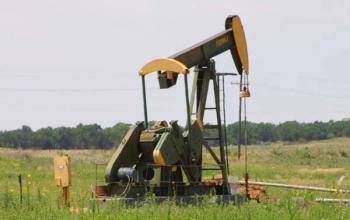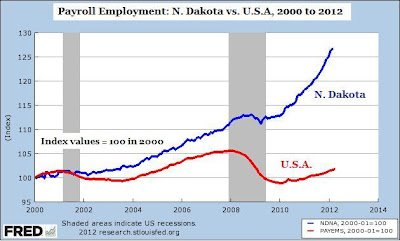The “Dakota Model” of Job Creation – It Works!
North Dakota’s economic success goes beyond its energy sector. The state’s pro-business climate gets some of the credit for the impressive job growth over the last five years. Whatever North Dakota is doing, it’s working, and the state should be a nationwide model.

By Mark J. Perry

It’s been widely reported here and elsewhere that North Dakota’s economy is booming, thanks largely to the energy-related prosperity in the western part of the state. The Peace Garden State’s jobless rate is the lowest in the country at 3% for March, more than five percentage points below the national average of 8.1%. Per-capita personal income in North Dakota increased more than 78% since 2000, more than double the 37.4% increase in per-capita income nationally.
The chart above displays monthly payroll employment levels for North Dakota and the U.S. back to January 2000 with both series expressed as indexes equal to 100 in January 2000. Overall employment in North Dakota has been growing steadily over the last decade, with a sharp acceleration over the last four years. Even the Great Recession that crippled the national labor market, barely slowed job creation in North Dakota. While the national economy is still 3.6% and five million jobs below December 2007 levels, North Dakota’s payrolls are 15% above pre-recession levels (see chart).
A recent news report highlights the fact that North Dakota’s economic success is not only due to oil prosperity, but also because of its pro-business climate and amazingly well-diversified economy, with many booming sectors including manufacturing, tourism, advanced manufacturing, information technology and agriculture. According to North Dakota Commerce Commissioner Alan Anderson, “Oil is just one piece of our economic success and our economy is much bigger and more diverse than ever before.” In fact, the oil industry is responsible for only 25% of the state’s revenue collections. Mr. Anderson highlights some of North Dakota’s diversified economic success:
1. The state’s technology sector has gained national recognition and its information technology job growth has been triple that of the nation. Microsoft and Amazon have both recently expanded in the state. Amazon added a 30,000-square-foot facility that will expand its customer service operations in Grand Forks and create 200 full-time jobs. Microsoft’s Fargo campus is one of the larger Microsoft locations worldwide, and its three buildings house over 1,500 employees, vendors and contingent staff.
2. Manufacturing continues to grow in North Dakota. One example is the recent expansion announcement by Caterpillar in West Fargo. Construction has started on a $50 million project that will create about 250 new jobs during the next three years, nearly doubling the plant’s current workforce. Caterpillar officials told us that North Dakota’s pro-business climate was a major factor in its decision to expand in West Fargo. Phoenix International, a company that manufactures electronics for John Deere, recently broke ground on a $22 million expansion project that will include 90,000 additional square feet in Fargo for an expanded work force. Other industrial expansions include WCCO Belting in Wahpeton, Harris Manufacturing in Oakes, and at the Monsanto and Cargill facilities in the Fargo area. Cargill recently started a $50-million expansion project and Monsanto has completed a $17.5 million expansion that has created 20 new jobs.
3. Tourism is another area that continues to drive North Dakota’s economy as the third-largest contributor to gross state product. The tourism industry growth is visible by looking at the number of new hotels constructed across the state. In the past two years, 21 new hotels have opened, adding 1,474 sleeping rooms in 11 communities. Another 24 hotels are under development and are expected to add another 1,800 rooms by later this year.
MP: It’s interesting to know that North Dakota’s economic success goes beyond its energy sector. The state’s pro-business climate gets some of the credit for the impressive job growth over the last five years. Whatever North Dakota is doing, it’s working, and the state should be a nationwide model for economic development and job growth – call it the “Dakota Model” (HT: Eagle Eye, see comments).
HT: BakkenBlog News
Dr. Mark J. Perry is a professor of economics and finance in the School of Management at the Flint campus of the University of Michigan. Perry holds two graduate degrees in economics (M.A. and Ph.D.) from George Mason University near Washington, D.C. In addition, he holds an MBA degree in finance from the Curtis L. Carlson School of Management at the University of Minnesota. He blogs at Carpe Diem.
Help Make A Difference By Sharing These Articles On Facebook, Twitter And Elsewhere:
